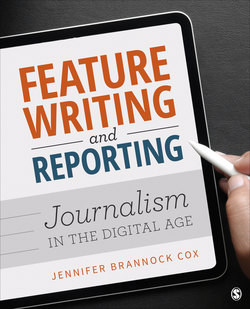Читать книгу Feature Writing and Reporting - Jennifer Brannock Cox - Страница 21
На сайте Литреса книга снята с продажи.
Diving In: Who Needs Journalists?
ОглавлениеWho is a journalist? Until recently, that was a simple question. A journalist was someone who worked for a news outlet gathering information, organizing it into a story and disseminating it to a mass audience. The widespread, immediate availability of free news online has not only changed the journalism industry but also called into question what it means to be a “journalist.” Although many in the field still regard “professional journalists” largely by traditional standards, some of the farthest-reaching and most influential journalism these days is produced by average citizens who have the instinct to point their smartphone cameras at news events unfolding around them. Newsrooms are shrinking at an alarming rate as more consumers turn to free information online that is selected and distributed by their friends on social media.
You may be asking yourself now: Why bother training to be a journalist? Why not just leave news to the masses to produce and spread? The answer to that actually is simple—we need you!
The accessibility of information has led to some great things. Younger Americans are exposed to news constantly online. The widespread availability of news on social media has resulted in greater news consumption among Americans ages 18 to 29.1 Those social media sites, like Facebook and Twitter, have also acted as platforms for exchanging ideas, organizing social movements and fostering connections that might otherwise have been impossible.
The news is not all good, though. Easy access to information has also led to the spreading of misinformation—both accidentally and intentionally, as we will learn in this chapter. Online news consumers have been able to avoid news and information that challenges their existing beliefs. This is largely due to the searchability of the internet and social media platforms’ advanced calculations, or algorithms, designed to show viewers primarily what they want to see.2 And while we are exposed to more news online, many consumers are not actually clicking beyond the initial headline or tweet to get the full meaning of the story. A recent study by researchers at Columbia University and the French National Institute found that 59% of links shared on Twitter were never clicked on, meaning that the person distributing the article never read it before sharing it.3
Journalists are needed—now more than ever—to add context to news events, to practice dogged reporting techniques and to act ethically to provide responsible journalism designed to help consumers understand issues and make informed decisions. Journalists work tirelessly to find stories that matter to the communities they serve and to tell those stories in ways that engage readers and demonstrate their own trustworthiness and proficiency. Producing journalism that makes an impact is important and rewarding. It is your job to sort through the clutter and get people the news they need to navigate in this brilliant and overwhelming Digital Age.
